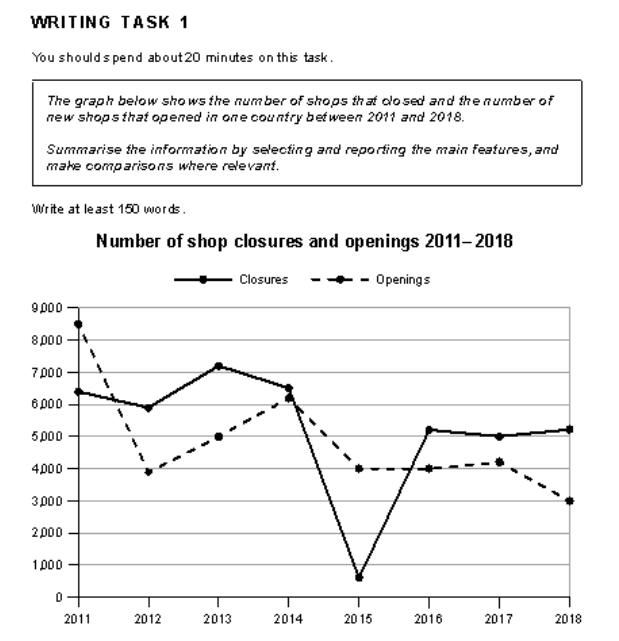支招小作文 | 线图 完全在过去 商店关张和开业数量
阅读量:

【开头段】
1. Shown in the graph are the number of shops closed and that of shops opened in one country, and the period of 2011 to 2018 is studied.
2. Overall, there was a disparity chiefly in two aspects between the two numbers.
【主体部分】分成3段
First, they differed markedly at the beginning of the time, 6,500 and 8,500 respectively, and so in the end, with slightly over 5,000 and 3000 in 2018. Second, the two numbers varied throughout the time in their own ways.
这一段总述。
然后说“关张”。
In terms of the shops closed, all other times witnessed either moderate fluctuations or stability, except the three-year period of 2014 to 2016. During the three years, a plunge – from 6,500 to the all-time low of roughly 700 – occurred first, and then there was a surge back to a high level – 5,000.
你会发现:老章的写法不是从左到右按照时间进展写。那样写又笨又生硬,肯定不得分。老章的写法是,浅写平淡的年份,专注写特殊的年份,因为那是图的【main features】。
然后说“开业”。
In terms of the number of shops opened, the initial few years are most notable, as it plummeted from 8,500 to 4000 and then sprang back to a high point of 6,000. However, during the subsequent years, the number fell to 4,000 again, stayed and slid further to 3,000.
你会发现:老章在这一段的写法是拆分。虽然是从左到右按部就班两段时间,但是通过“the initial few years are most notable”来凸显老章在写图的【main features】。以及,即使写法普通,老章还是可以通过【用词】和【状语从句】来拿分。
补充:
线图的时间轴,会出现三种。
按照出现的可能性排序:
1)完全在过去:
一般过去(在过去发生过);
过去进行(在过去持续发生);
过去完成(比一般过去更早的过去+强调累积性结果)。
2)过去到现在:
一般过去(在过去发生过);
过去进行(在过去持续发生);
过去完成(比一般过去更早的过去 + 强调累积性结果);
现在完成(强调累积性结果)。
3)过去到将来:
一般过去(在过去发生过);
过去进行(在过去持续发生);
过去完成(比一般过去更早的过去 + 强调累积性结果);
现在完成(强调累积性结果);
一般将来时(注意可能性的大小)。
老章有对应范文,在合辑里找到。
